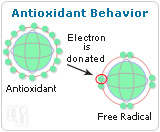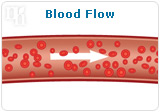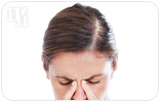
The hormone estrogen has many functions in women's bodies. It can receive and deliver messages, delegate and carry out orders and protect and heal many areas or systems in your body. Antioxidant is one of the many hats that estrogen wears. An antioxidant does just what it says, it "anti oxidizes," or prevents an imbalance of oxygen in your cells. This may sound absurd, but it can be quite harmful.
During menopause, women are left with much less estrogen than your body has been accustomed to, and may become more vulnerable to certain natural toxins. Read below to understand one of the many responsibilities of estrogen.
How Does Estrogen Act as an Antioxidant?
When there are too many free radicals in your body, estrogen steps up to the plate to prevent them from causing too much oxidation in your system, which can lead to oxidative stress. This condition contributes to increased blood pressure and hypertension.
So, estrogen talks to the mitochondria, or the part of a cell that produces energy and tells your cells to produce a chemical called quinol; the quinol creates a shield to protect your body from the oxidizing free radicals.
Why Are Antioxidants Beneficial?
The harmful free radicals that your body produces throughout your lifetime are destroyed by antioxidants, protecting you from:

- Heart problems. Antioxidants help your blood vessels remain open and flexible.
- Brain malfunctions. Antioxidants have been shown to help protect the brain from Alzheimer's and cognitive problems like memory loss.
- Bone loss. They are also known to help heal breaks and fractures more quickly.
- Cancer. Free radicals are known as cancer causing agents; antioxidants are their weakness.
Where Else Can I Find Antioxidants?
To keep your natural estrogen from being spread too thin, try supplementing your diet with antioxidants that are in everyday foods. Some foods those are high in antioxidants include:
- Grapes
- Dark colored berries, like blueberries and blackberries.
- Artichokes
- Beans
- Cruciferous vegetables
Additional Information
Talk with your doctor. Antioxidants possess great preventative and healing powers. If you are experiencing health problems, the answer may not be as simple as eating more foods that contain antioxidants. Some women require alternative treatments and medications, particularly when trying to balance estrogen. However, it would be difficult to find a doctor who says a healthy diet and exercise regimen are a bad idea. To read more about estrogen and its role, follow this link.

